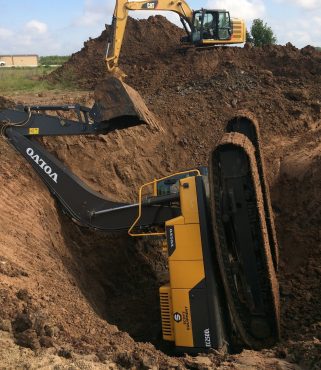
John Bleasby
Insuring the big stuff is critical for contractors
Canadian ContractorLosing drill or a chop saw is annoying enough, but what about a backhoe?
Many contractors are becoming vertically integrated these days. That means they can undertake a building project from the foundations to the roof. That in turn means buying, leasing or renting larger machinery for the heavy work. However, like everything else related to the business —liability and worker’s comp, for example — there must be appropriate insurance in place for those expensive pieces of equipment. There could tens of thousands of dollars at stake!
 David Elliott of InsureMyTools.ca, is an insurance expert based in Newcastle, Ontario, an agency that offers policies specific to contractors. Elliott’s company website offers the real life example of a $58,000 backhoe that goes missing one night. The contractor not only needs replacement insurance, he needs coverage that will pay for a rental in the short term. That’s the sort of insurance planning we’re talking about — the short term need to keep the job running as well as the long term need to replace the lost machinery. There are, of course, a number of packages for equipment coverage as low as $2500 that can be selected, and specific add-ons to suit every contracting need at every level.
David Elliott of InsureMyTools.ca, is an insurance expert based in Newcastle, Ontario, an agency that offers policies specific to contractors. Elliott’s company website offers the real life example of a $58,000 backhoe that goes missing one night. The contractor not only needs replacement insurance, he needs coverage that will pay for a rental in the short term. That’s the sort of insurance planning we’re talking about — the short term need to keep the job running as well as the long term need to replace the lost machinery. There are, of course, a number of packages for equipment coverage as low as $2500 that can be selected, and specific add-ons to suit every contracting need at every level.
Elliott answered some questions that might be in the back of contractor’s minds as they review their coverage.
Are there insurance requirement differences between equipment that is owned versus equipment that is leased or rented?
Yes, there is a very big difference. Most contractor insurance packages can be endorsed to include coverage for equipment owned by the insured at an amount chosen by the insured. However, depending on the wording of the specific policy, it may not cover leased and rented equipment. Those policies that do include rented or borrowed machinery and equipment, of course, give contractors peace of mind.
Contractors should also check to see if they are permitted to increase their coverage during the policy term. It’s also important that contractors review their wordings to ensure rented or borrowed equipment is included in the definition of machinery and equipment.
Do leasing and rental companies expect the contractor to have coverage?
In my experience, it depends on the company. However, I have yet to see a leasing company release equipment without proof of insurance. Rental companies, on the other hand, appear to be divided. Some will require proof of insurance or sell it to you when you rent. Others will not require coverage, but ask you to sign a waiver that you are responsible for damages.
Is it better to have insurance coverage for rental equipment included in one’s own policy? Rental car companies are always trying to sell insurance on the spot, but it’s expensive.
Some policies like the ones we offer have it included in the policy. Therefore, if you purchase it at the rental company you would technically be paying twice.
What about insurance for damages caused by an inexperienced (or even an experienced) operator? Is that covered under another part of the company’s liability insurance, or do those risks require specific coverage?
That is a great question. It really depends on the company and the damage incurred. Many companies will exclude things like tire damage and damage resulting from breaking through ice. I can’t speak for all policies, but I know ours will not exclude damages caused by an inexperience driver. So, for example, if the operator backs the equipment into a concrete wall, the policy would cover the damages to the equipment up to the policy limit.
What other considerations should a contractor keep in mind?
I can’t stress enough the importance of open communication between the contractor and the insurance provider. It’s critical to remember the policy is a legal contract, and each one is different. That means reading and understanding not only what is described on the coverage declaration pages, but what is outlined in the 130+ pages attached to the insurance policy. As always, formulating a good policy is a balance between price and coverage requirements. And in terms of communication, if the contractor has a company that doesn’t respond, or charges whenever you ask them a question, it’s time to switch providers.
Got feedback? Make your opinion count by using the comment section below,
or by sending an email to:
JBleasby@canadiancontractor.ca
Follow John on Instagram and on Twitter for notifications about his latest posts

Advertisement
Print this page

Must have my own coverage to rent an excavator from a company and name the company the loss payee